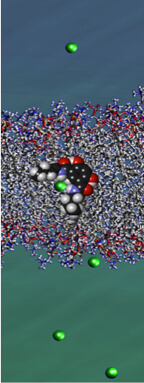 Supramolecular chemistry and nanoscience are concerned with the creation of new structures with at least one of the dimensions on the nanometer scale that exhibit exciting new properties and functions in the biological, materials, and energy realms. The research interests of faculty in the Department of Chemistry and Biochemistry in these areas are broad and deep and represent a strategic focus area.
Supramolecular chemistry and nanoscience are concerned with the creation of new structures with at least one of the dimensions on the nanometer scale that exhibit exciting new properties and functions in the biological, materials, and energy realms. The research interests of faculty in the Department of Chemistry and Biochemistry in these areas are broad and deep and represent a strategic focus area.
For example, at the molecular scale, the research groups of Davis, Isaacs, and Gutierrez create new organic synthetic host structures that either function as catalysts or perform selective molecular recognition of ions and drugs in water and/or membrane environments and are thereby able to augment and control the function of the targeted biological systems. Synthetic polymers, biopolymers, and their self-assemblies are the focus of research in the Colombini, Kahn, Paukstelis, Raghavan, and Sita groups with the goal of understanding the basic science rules of self-assembly and using them to create new commodity polyolefins as well as materials for drug delivery and medical diagnostics. Nanoscale particles are a focus of several research groups (DeShong, Eichhorn) with applications ranging from catalysis to vaccine development to aerosols. Beyond individual nanostructures, the research groups of Fourkas, S. B. Lee, and Y. Wang are creating precision architectures using light and innovative chemical methods of nanofabrication developed in their laboratories to guide the motion of cells and to enable next-generation energy technologies. At the interface of molecules and solids, the research groups of Reutt-Robey, Y. Wang, and Weeks are developing experimental and theoretical methods to probe and tailor fluorescent quantum defects and nanostructured interfaces for controlling charge transport and tracking structure/chemical evolution.














